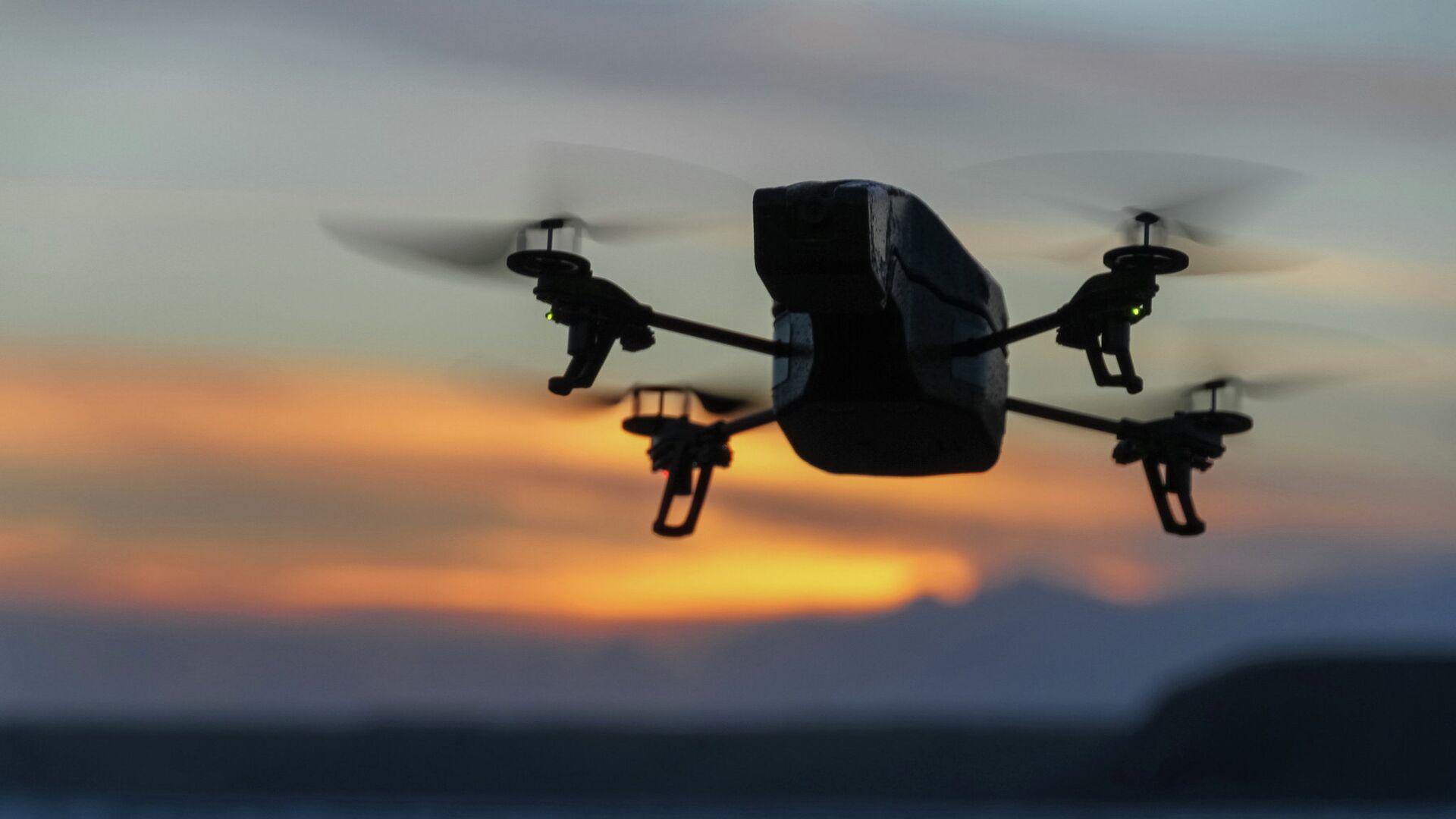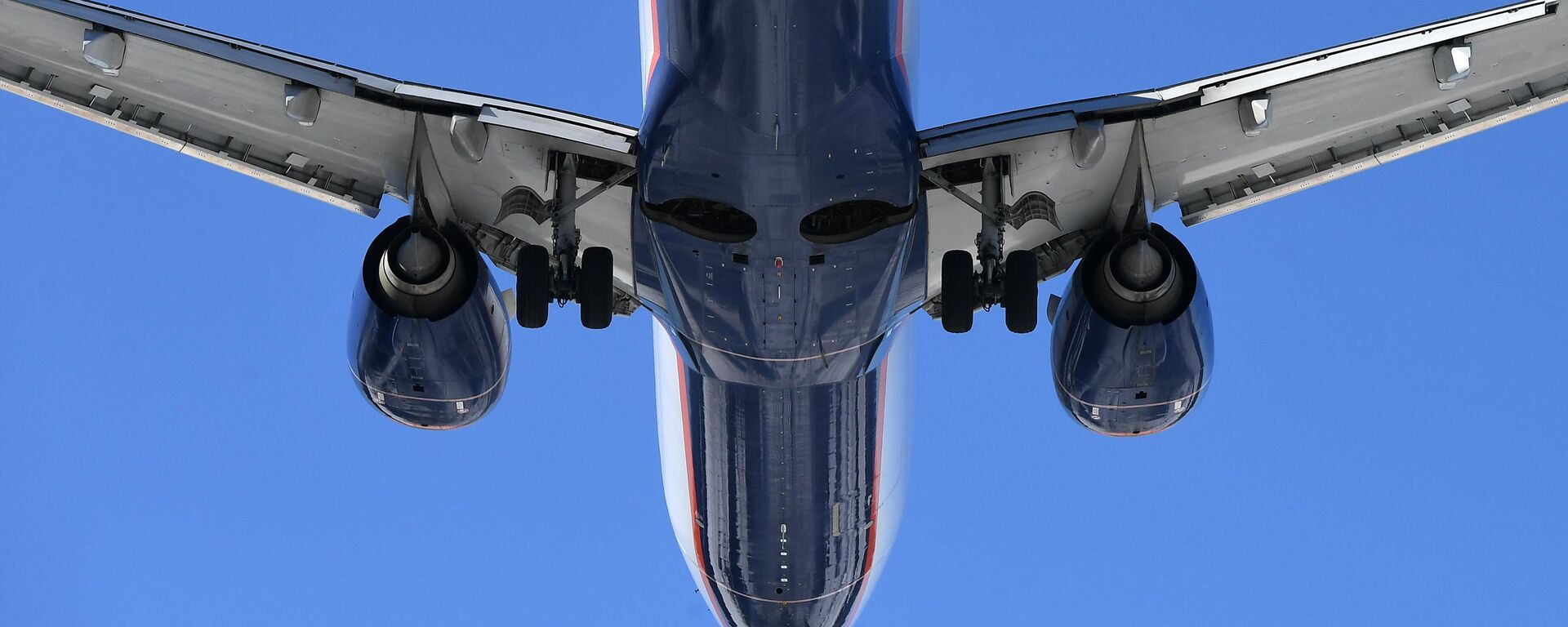https://sputnikglobe.com/20230127/russia-developing-swarm-attack-drones-for-battlefield-rostec-ceo-reveals-1106765908.html
Russia Developing Swarm Attack Drones for Battlefield, Rostec CEO Reveals
Russia Developing Swarm Attack Drones for Battlefield, Rostec CEO Reveals
Sputnik International
In this interview with Sputnik, Rostec CEO Sergey Chemezov reveals whether claims made by the West and Ukraine about Russia "running out of weapons" are true.
2023-01-27T16:13+0000
2023-01-27T16:13+0000
2023-01-27T16:14+0000
russia
rostec
drones
armed drones
ukraine
drone swarm
weapons
https://cdn1.img.sputnikglobe.com/img/102809/69/1028096941_0:0:2048:1153_1920x0_80_0_0_0cd9c75dd145672a75def075414811a0.jpg
In this interview with Sputnik, Rostec CEO Sergey Chemezov reveals whether claims made by the West and Ukraine about Russia "running out of weapons" are true. He also explains how the corporation is coping with sanctions, what it achieved in 2022, what the company's 2023 plans are, and more.Sputnik: What do you consider to be the main results achieved by Rostec over the past year?Chemezov: We persevered. Contrary to what our enemies expected, we did not stop our conveyors, we did not lay off people, and we did not stop our production programs. On the contrary, we hired specialists, continued to supply military products to the army, and increased production. We were able to fulfill our obligations to the Ministry of Defense in many areas ahead of schedule.We are also continuing all major civilian programs in aircraft construction, engines, electronics and medicine. This is a great credit to our work collectives. They work in several shifts and do their best for the country. I think this is the most important result.Sputnik: Last year, the volume of state defense orders increased significantly. What types of military products were most in demand?Chemezov: Everything that is now massively involved in the zone of the special military operation (SMO), including barrel and rocket artillery, armored vehicles of various classes, attack and transport helicopters, assault aircraft, and fighter jets, heavy flamethrower systems, small arms and ammunition, were most in demand.In the news, you can see many examples of our equipment, which helps to solve the tasks of the SMO. These include T-90M "Proryv" tanks, Iskanders, various types of MLRS, combat air vehicles such as Ka-52 and Mi-28 helicopters, Su-35S and Su-57 fighters, "Kub" and "Lancet" drones, and many others.It is important that we work with the military and get their feedback. This allows us to respond quickly to changing needs, make design changes and improve our products. For example, the AK-12 assault rifle has been significantly improved based on the results of its use in the SMO. It has become more ergonomic. An improved version will be put into production this year.Sputnik: Last year, there was a discussion about the army not having enough drones. How do you address this problem?Chemezov: We are ready to supply drones in accordance with the needs of the Ministry of Defense. For example, the Kalashnikov Concern is very active in this area and is expanding its production. The same "Lancets" are now used intensively and very efficiently in the special military operation zone. Small tactical drones are also being developed, capable of reconnaissance, automatic enemy detection and artillery targeting. They can drop grenades and launch swarm attacks. This technology has changed the nature of warfare. Both the Ministry of Defense and we understand this. We are working closely together on this issue.Sputnik: The special military operation requires an enormous amount of ammunition. Is the defense industry doing well on this front?Chemezov: The talk of our adversaries today about Russia allegedly running out of missiles, shells and other things is complete nonsense. The consumption of ammunition in the air defense zone is indeed high. We are talking about artillery and tank shells, rocket weapons and small arms ammunition. Accordingly, at the request of the Ministry of Defense, we have increased the production of ammunition by several times, and for some types by several orders of magnitude.Sputnik: How successful was the corporation in achieving the financial targets set for 2022, despite the new large-scale anti-Russian sanctions imposed by the West in connection with the special military operation?Chemezov: We have not yet finalized the results, but we can already draw some conclusions. The year before last, we reached a record level of civil revenues: their share was 45.5%. By the end of 2022, we expect to see a slight decline, and the share of civil products will be around 40%. And I think this is a good indicator, considering that the main efforts are now focused on the state defense order.We expect consolidated revenues to exceed 2.1 trillion rubles – there is growth, it is less than expected, but we have it despite sanctions and other difficulties.Sputnik: How much profit did the corporation make? And what revenue do you expect in 2023?Chemezov: We'd better refrain from making predictions now, you understand why. Rostec has never been super-profitable. First, our goal is not profit per se, but the development of production and solving state tasks. Second, we are in the defense industry, where pricing is different from banking, raw materials, or trade. Now, when state defense orders prevail, we work at zero in the best case, if not at a loss. That is the requirement of the times.At the same time, it would be wrong to say that we don't think about profits at all. Every company thinks about it. Because its sustainability, its investments and its human resources depend on it. Our strategy provides for progressive growth in financial indicators, including profit. There are benchmarks that we strive for.Sputnik: The sanctions have left manufacturers without components. For example, last year KAMAZ had problems with the production of K5 generation vehicles, and the MC-21 program essentially had to be restarted from scratch. What is your assessment of the current situation?Chemezov: I do not agree about "from scratch," the MC-21 program is actually at the finish line today. We have solved the problem with the engine, with the "black wing". The Federal Air Transport Agency (Rosaviatsiya) has approved the main changes to the standard design related to the installation of the PD-14 and the wing made of domestic composite materials. In 2023, we plan to start testing other systems of the aircraft so that by the end of 2024 we could certify a fully Russian-made aircraft and start mass production. Some of these systems are already being tested.As for KAMAZ, the results speak for themselves: almost 44,000 vehicles were produced in 2022. In other words, despite the market situation and all the difficulties, production remained practically at the level of 2021. After western partners left, several thousand components had to be replaced. In particular, the production of diesel engines and transmissions had to be localized completely. As a result, the KAMAZ engineers not only copied foreign technology, but also improved their products. For example, the K5 truck has a lower fuel consumption, it is less noisy, and it can be serviced once in 150,000 instead of 120,000 kilometers, which is a very good indicator, even if it is compared to the well-known world brands.Sputnik: What key projects in both the civil and military segments of the corporation do you expect to complete in 2023?Chemezov: Today, all of our focus is on the national defense order. I think this will remain our top priority in the coming months. Our main goal remains unchanged - 100% fulfillment of the state defense order. The volume has increased many times over and we are doing everything we can to meet this challenge.In the civilian sector, the key tasks remain in aircraft construction. The country needs its own aircraft - modern and in large numbers, so that we can forget about Boeings and Airbuses forever. I have already mentioned the MC-21. Another project is the import substitution of the SuperJet. This year we expect to complete a full set of tests on the PD-8 engine to obtain a type certificate, and then complete tests on this engine as part of the aircraft. The same is true for other systems and units of the aircraft. So next year we can start serial deliveries of the aircraft to airlines. It is a very complex task, and our aviation companies are working at the limits of their capabilities. No one in the world has ever implemented such projects in such a short time.Sputnik: There is a lot of talk about the aviation industry right now, but what about the other industries you work in?Chemezov: There are more than 800 companies in the corporation, and we cover many industries. It is easier to say where we do not work. Another industry where we are very much expected to deliver is the energy industry. After all, the sanctions have completely banned the supply of energy equipment to the country. This year, we are ready to supply Gazprom with the first four GTA-8 gas turbine units for the power plant that supplies the oil and gas platform. Among other things, this equipment is capable of operating in Arctic conditions. There have been no such projects in Russia before, only imported equipment.In addition, just a few days ago we delivered the first GTD-110M series gas turbine. This is a high-capacity turbine for power generation, the only one of its class in Russia now. It is a completely domestic development. It will replace foreign units, such as Siemens and General Electric. I would call it a milestone.I would also like to mention medicine, where we are active in pharmaceuticals (we produce vaccines and immunoprophylaxis) and medical equipment. For example, this year we are launching a new line of "Mobivent" artificial lung ventilators at the Ural Instrument Making Plant. These devices can be used, among other things, to treat premature babies.Sputnik: Rostec celebrated its 15th anniversary in 2022: what are the main "interim" results of the state corporation's work during this serious period? What key tasks for the development of domestic industry have been solved thanks to its creation?Chemezov: The most important result is what Rostec has become. From a scattering of enterprises drowning in losses, we have become the country's largest manufacturing company. Fifteen years ago, almost half of the enterprises that were transferred to us were in crisis. The debts of many enterprises had been accumulating since the 1990s. Production equipment was at a very low level. There were huge problems with civil production and sales. In 2009, our companies' revenues were about half a trillion rubles and their losses were 60 billion rubles.Today, the picture is completely different: modern equipment, new stores, and new types of products. Sales have quadrupled. We have been able to create a company that successfully withstands external pressures and produces thousands of products, both military and civilian, from airplanes to vaccines.Sputnik: Are there any plans to integrate new civilian or military enterprises into Rostec?Chemezov: Increasing the number of companies is not an end in itself. There are two scenarios. Either we enter into a partnership with the company if it has interesting competencies, access to markets and so on. Or there is a state decision and it is necessary to normalize the work of some asset or we need to consolidate competencies, as was the case with aircraft construction. In recent years, KTZ, UVZ, UAC and other companies have joined us on this path. Today all of them are working stably.A striking example is JSC Kurganmashzavod, which produces modern types of armored personnel carriers, infantry fighting vehicles and other equipment. It was one of the "tractor plants" that became notorious and almost brought down many plants across the country. We literally saved the legendary plant from closure and bankruptcy. Today it is successfully operating as part of High Precision Systems, supplying armored vehicles required by the SMO and in time to fulfill the 2022 State Defense Order for the delivery of BMP-3, BTR-MDM and BMD-4M amphibious armored vehicles.Recently, a decision was made to transfer 15 more assets to us, a significant portion of which is gunpowder factories. These are state-owned enterprises that produce specialty chemicals and ammunition components. We will corporatize them, integrate them into the structure of our two holdings, and modernize and re-equip them. We have been monitoring the activities of these plants since 2022. We have already identified their equipment needs. We plan to invest tens of billions of rubles in their modernization. The aim of these measures is to create a new image of the defense industry.Sputnik: How much does Rosoboronexport plan to export weapons abroad in 2023? Was the special exporter's plan for arms deliveries fulfilled last year?Chemezov: As I said earlier, the main efforts of our enterprises are now focused on fulfilling the state defense order. At the same time, Rostec has reliable partners in Asia, the Middle East, Africa and Latin America. We appreciate their principled position and are in close contact with them, solving the most complex tasks together. There are plans to expand our cooperation.Traditionally, I will not disclose details, Rosoboronexport works in accordance with the tasks set for us by the president and the government. Overall, I can say that we are doing well, despite the opposition of unfriendly countries. We will not give up our position in the global arms market.Sputnik: How justified is the system of mutual settlements with foreign partners in national currencies? What percentage of arms deals are made in them today?Chemezov: We have repeatedly announced the transition to national currency settlements with our partners. These were timely and, as today's situation shows, justified actions. The share of such agreements is now close to 100%.
https://sputnikglobe.com/20220825/soldier-of-the-future-russias-ratnik-helmet-more-reliable-than-nato-analogues---rostec-1099989556.html
https://sputnikglobe.com/20220812/russias-rostec-develops-tech-for-creating-combat-robots-from-any-heavy-armor-deputy-ceo-says-1099515464.html
https://sputnikglobe.com/20220330/russias-largest-airline-moves-all-aircraft-to-national-jurisdiction-1094319077.html
https://sputnikglobe.com/20230127/russias-super-flanker-which-countries-purchase-su-35-aircraft-1106761697.html
https://sputnikglobe.com/20220812/russia-completes-development-of-mini-missiles-for-pantsir-air-defense-systems-rostec-1099499229.html
https://sputnikglobe.com/20220808/drone-tank-to-debut-at-russias-army-2022-forum-rostec-reveals-1099571871.html
ukraine
Sputnik International
feedback@sputniknews.com
+74956456601
MIA „Rossiya Segodnya“
2023
Sputnik International
feedback@sputniknews.com
+74956456601
MIA „Rossiya Segodnya“
News
en_EN
Sputnik International
feedback@sputniknews.com
+74956456601
MIA „Rossiya Segodnya“
Sputnik International
feedback@sputniknews.com
+74956456601
MIA „Rossiya Segodnya“
rostec ceo, rostec ceo interview, russian weapons, russian drones, special military operation in ukraine, swarm attack drones, swarm attack drones in ukraine, russia developing swarm attack drones
rostec ceo, rostec ceo interview, russian weapons, russian drones, special military operation in ukraine, swarm attack drones, swarm attack drones in ukraine, russia developing swarm attack drones
In this interview with Sputnik,
Rostec CEO Sergey Chemezov reveals whether claims made by the West and Ukraine about Russia "running out of weapons" are true. He also explains how the corporation is coping with sanctions, what it achieved in 2022, what the company's 2023 plans are, and more.
Sputnik: What do you consider to be the main results achieved by Rostec over the past year?
Chemezov: We persevered. Contrary to what our enemies expected, we did not stop our conveyors, we did not lay off people, and we did not stop our production programs. On the contrary, we hired specialists, continued to supply military products to the army, and increased production. We were able to fulfill our obligations to the Ministry of Defense in many areas ahead of schedule.
We are also continuing all major civilian programs in aircraft construction, engines, electronics and medicine. This is a great credit to our work collectives. They work in several shifts and do their best for the country. I think this is the most important result.
Sputnik: Last year, the volume of state defense orders increased significantly. What types of military products were most in demand?
Chemezov: Everything that is now massively involved in the zone of the special military operation (SMO), including barrel and rocket artillery, armored vehicles of various classes, attack and transport helicopters, assault aircraft, and fighter jets, heavy flamethrower systems, small arms and ammunition, were most in demand.
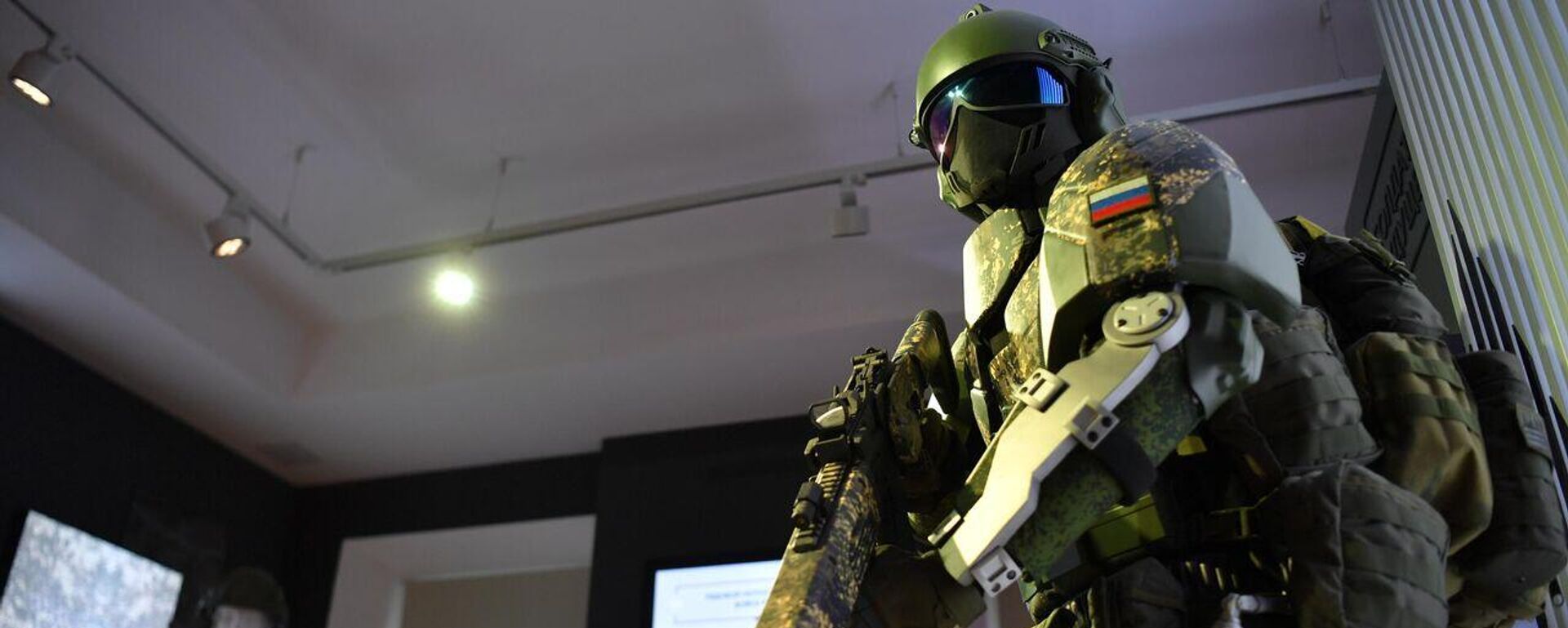
25 August 2022, 12:37 GMT
In the news, you can see many examples of our equipment, which helps to solve the tasks of the SMO. These include T-90M "Proryv" tanks, Iskanders, various types of MLRS, combat air vehicles such as Ka-52 and Mi-28 helicopters, Su-35S and Su-57 fighters, "Kub" and "Lancet" drones, and many others.
It is important that we work with the military and get their feedback. This allows us to respond quickly to changing needs, make design changes and improve our products. For example, the AK-12 assault rifle has been significantly improved based on the results of its use in the SMO. It has become more ergonomic. An improved version will be put into production this year.
Sputnik: Last year, there was a discussion about the army not having enough drones. How do you address this problem?
Chemezov: We are ready to supply drones in accordance with the needs of the Ministry of Defense. For example, the Kalashnikov Concern is very active in this area and is expanding its production. The same "Lancets" are now used intensively and very efficiently in the special military operation zone.
Small tactical drones are also being developed, capable of reconnaissance, automatic enemy detection and artillery targeting. They can drop grenades and launch swarm attacks. This technology has
changed the nature of warfare. Both the Ministry of Defense and we understand this. We are working closely together on this issue.
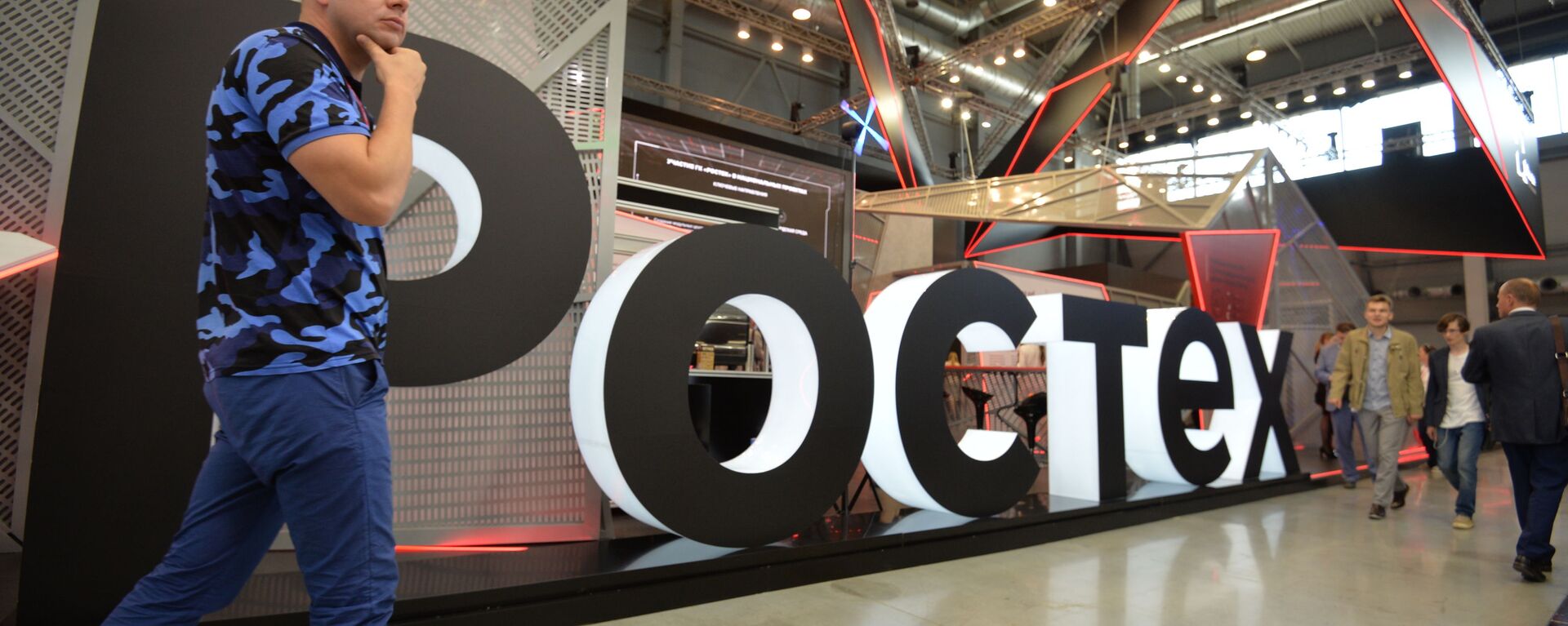
12 August 2022, 11:45 GMT
Sputnik: The special military operation requires an enormous amount of ammunition. Is the defense industry doing well on this front?
Chemezov: The talk of our adversaries today about Russia allegedly running out of missiles, shells and other things is complete nonsense. The consumption of ammunition in the air defense zone is indeed high. We are talking about artillery and tank shells, rocket weapons and small arms ammunition. Accordingly, at the request of the Ministry of Defense, we have increased the production of ammunition by several times, and for some types by several orders of magnitude.
Sputnik: How successful was the corporation in achieving the financial targets set for 2022, despite the new large-scale anti-Russian sanctions imposed by the West in connection with the special military operation?
Chemezov: We have not yet finalized the results, but we can already draw some conclusions. The year before last, we reached a record level of civil revenues: their share was 45.5%. By the end of 2022, we expect to see a slight decline, and the share of civil products will be around 40%. And I think this is a good indicator, considering that the main efforts are now focused on the state defense order.
We expect consolidated revenues to exceed 2.1 trillion rubles – there is growth, it is less than expected, but we have it despite sanctions and other difficulties.
Sputnik: How much profit did the corporation make? And what revenue do you expect in 2023?
Chemezov: We'd better refrain from making predictions now, you understand why. Rostec has never been super-profitable. First, our goal is not profit per se, but the development of production and solving state tasks. Second, we are in the defense industry, where pricing is different from banking, raw materials, or trade. Now, when state defense orders prevail, we work at zero in the best case, if not at a loss. That is the requirement of the times.
At the same time, it would be wrong to say that we don't think about profits at all. Every company thinks about it. Because its sustainability, its investments and its human resources depend on it. Our strategy provides for progressive growth in financial indicators, including profit. There are benchmarks that we strive for.
Sputnik: The sanctions have left manufacturers without components. For example, last year KAMAZ had problems with the production of K5 generation vehicles, and the MC-21 program essentially had to be restarted from scratch. What is your assessment of the current situation?
Chemezov: I do not agree about "from scratch," the MC-21 program is actually at the finish line today. We have solved the problem with the engine, with the "black wing". The Federal Air Transport Agency (Rosaviatsiya) has approved the main changes to the standard design related to the installation of the PD-14 and the wing made of domestic composite materials. In 2023, we plan to start testing other systems of the aircraft so that by the end of 2024 we could certify a fully Russian-made aircraft and start mass production. Some of these systems are already being tested.
As for KAMAZ, the results speak for themselves: almost 44,000 vehicles were produced in 2022. In other words, despite the market situation and all the difficulties, production remained practically at the level of 2021. After western partners left, several thousand components had to be replaced. In particular, the production of diesel engines and transmissions had to be localized completely. As a result, the KAMAZ engineers not only copied foreign technology, but also improved their products. For example, the K5 truck has a lower fuel consumption, it is less noisy, and it can be serviced once in 150,000 instead of 120,000 kilometers, which is a very good indicator, even if it is compared to the well-known world brands.
Sputnik: What key projects in both the civil and military segments of the corporation do you expect to complete in 2023?
Chemezov: Today, all of our focus is on the national defense order. I think this will remain our top priority in the coming months. Our main goal remains unchanged - 100% fulfillment of the state defense order. The volume has increased many times over and we are doing everything we can to meet this challenge.
In the civilian sector, the key tasks remain in aircraft construction. The country needs its own aircraft - modern and in large numbers, so that we can forget about Boeings and Airbuses forever. I have already mentioned the MC-21. Another project is the import substitution of the SuperJet. This year we expect to complete a full set of tests on the PD-8 engine to obtain a type certificate, and then complete tests on this engine as part of the aircraft. The same is true for other systems and units of the aircraft. So next year we can start serial deliveries of the aircraft to airlines. It is a very complex task, and our aviation companies are working at the limits of their capabilities. No one in the world has ever implemented such projects in such a short time.
Sputnik: There is a lot of talk about the aviation industry right now, but what about the other industries you work in?
Chemezov: There are more than 800 companies in the corporation, and we cover many industries. It is easier to say where we do not work. Another industry where we are very much expected to deliver is the energy industry. After all, the sanctions have completely banned the supply of energy equipment to the country. This year, we are ready to supply Gazprom with the first four GTA-8 gas turbine units for the power plant that supplies the oil and gas platform. Among other things, this equipment is capable of operating in Arctic conditions. There have been no such projects in Russia before, only imported equipment.
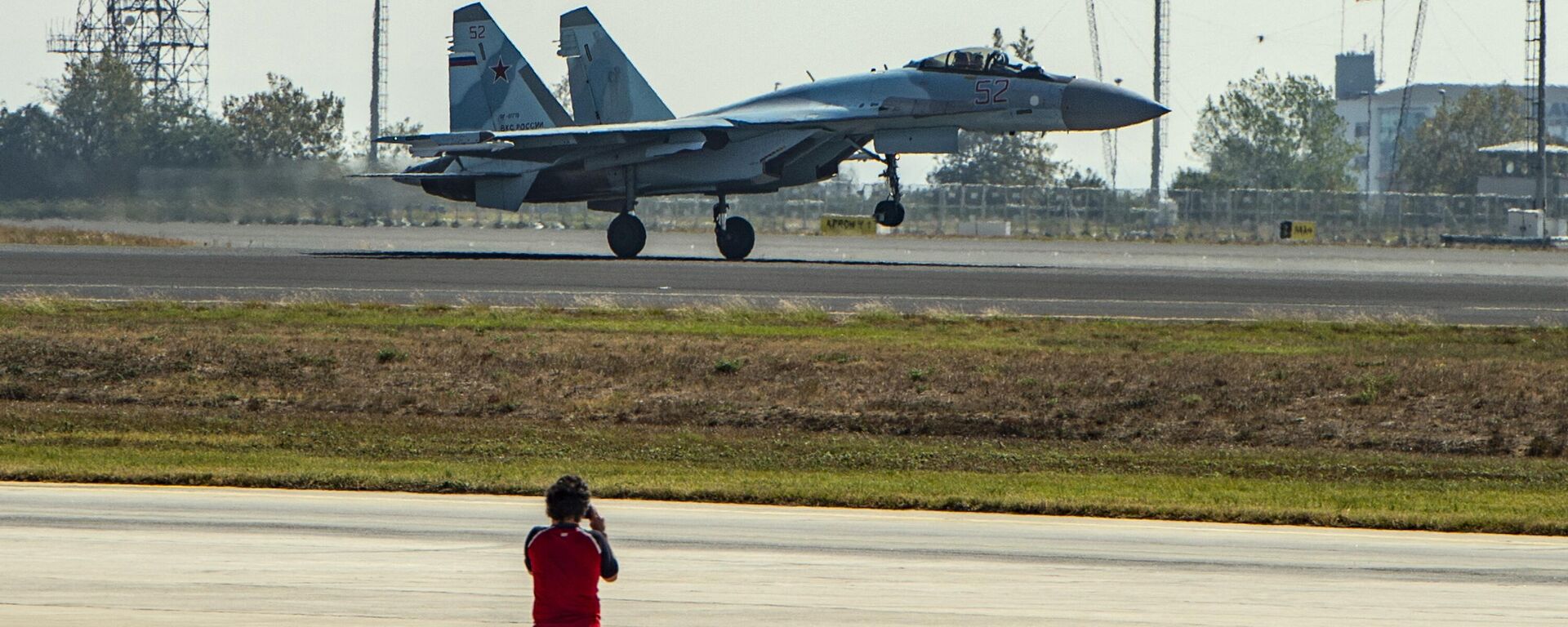
27 January 2023, 13:45 GMT
In addition, just a few days ago we delivered the first GTD-110M series gas turbine. This is a high-capacity turbine for power generation, the only one of its class in Russia now. It is a completely domestic development. It will replace foreign units, such as Siemens and General Electric. I would call it a milestone.
I would also like to mention medicine, where we are active in pharmaceuticals (we produce vaccines and immunoprophylaxis) and medical equipment. For example, this year we are launching a new line of "Mobivent" artificial lung ventilators at the Ural Instrument Making Plant. These devices can be used, among other things, to treat premature babies.
Sputnik: Rostec celebrated its 15th anniversary in 2022: what are the main "interim" results of the state corporation's work during this serious period? What key tasks for the development of domestic industry have been solved thanks to its creation?
Chemezov: The most important result is what Rostec has become. From a scattering of enterprises drowning in losses, we have become the country's largest manufacturing company. Fifteen years ago, almost half of the enterprises that were transferred to us were in crisis. The debts of many enterprises had been accumulating since the 1990s. Production equipment was at a very low level. There were huge problems with civil production and sales. In 2009, our companies' revenues were about half a trillion rubles and their losses were 60 billion rubles.
Today, the picture is completely different: modern equipment, new stores, and new types of products. Sales have quadrupled. We have been able to create a company that successfully withstands external pressures and produces thousands of products, both military and civilian, from airplanes to vaccines.
Sputnik: Are there any plans to integrate new civilian or military enterprises into Rostec?
Chemezov: Increasing the number of companies is not an end in itself. There are two scenarios. Either we enter into a partnership with the company if it has interesting competencies, access to markets and so on. Or there is a state decision and it is necessary to normalize the work of some asset or we need to consolidate competencies, as was the case with aircraft construction. In recent years, KTZ, UVZ, UAC and other companies have joined us on this path. Today all of them are working stably.
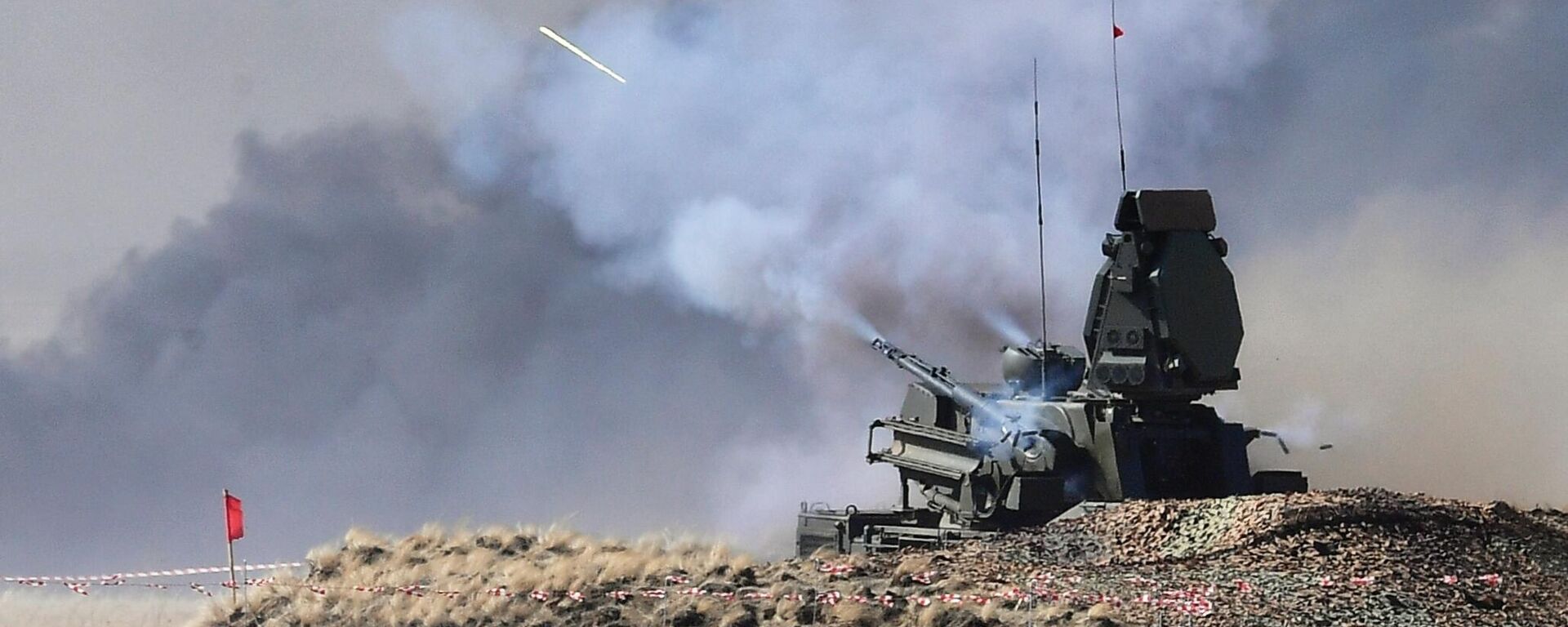
12 August 2022, 04:58 GMT
A striking example is JSC Kurganmashzavod, which produces modern types of armored personnel carriers, infantry fighting vehicles and other equipment. It was one of the "tractor plants" that became notorious and almost brought down many plants across the country. We literally saved the legendary plant from closure and bankruptcy. Today it is successfully operating as part of High Precision Systems, supplying armored vehicles required by the SMO and in time to fulfill the 2022 State Defense Order for the delivery of BMP-3, BTR-MDM and BMD-4M amphibious armored vehicles.
Recently, a decision was made to transfer 15 more assets to us, a significant portion of which is gunpowder factories. These are state-owned enterprises that produce specialty chemicals and ammunition components. We will corporatize them, integrate them into the structure of our two holdings, and modernize and re-equip them. We have been monitoring the activities of these plants since 2022. We have already identified their equipment needs. We plan to invest tens of billions of rubles in their modernization. The aim of these measures is to create a new image of the defense industry.
Sputnik: How much does Rosoboronexport plan to export weapons abroad in 2023? Was the special exporter's plan for arms deliveries fulfilled last year?
Chemezov: As I said earlier, the main efforts of our enterprises are now focused on fulfilling the state defense order. At the same time, Rostec has reliable partners in Asia, the Middle East, Africa and Latin America. We appreciate their principled position and are in close contact with them, solving the most complex tasks together. There are plans to expand our cooperation.
Traditionally, I will not disclose details, Rosoboronexport works in accordance with the tasks set for us by the president and the government. Overall, I can say that we are doing well, despite the opposition of unfriendly countries. We will not give up our position in the global arms market.
Sputnik: How justified is the system of mutual settlements with foreign partners in national currencies? What percentage of arms deals are made in them today?
Chemezov: We have repeatedly announced the transition to national currency settlements with our partners. These were timely and, as today's situation shows, justified actions. The share of such agreements is now close to 100%.
